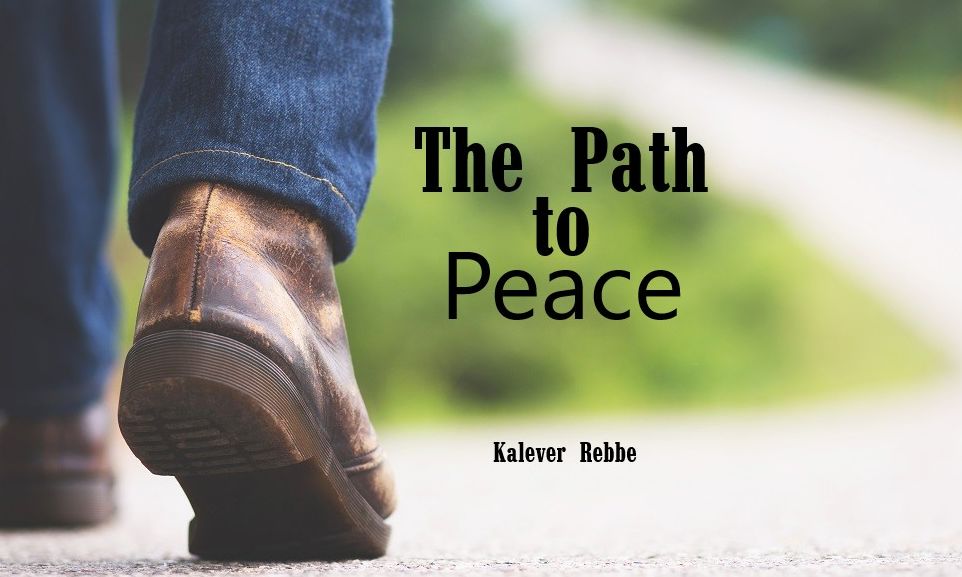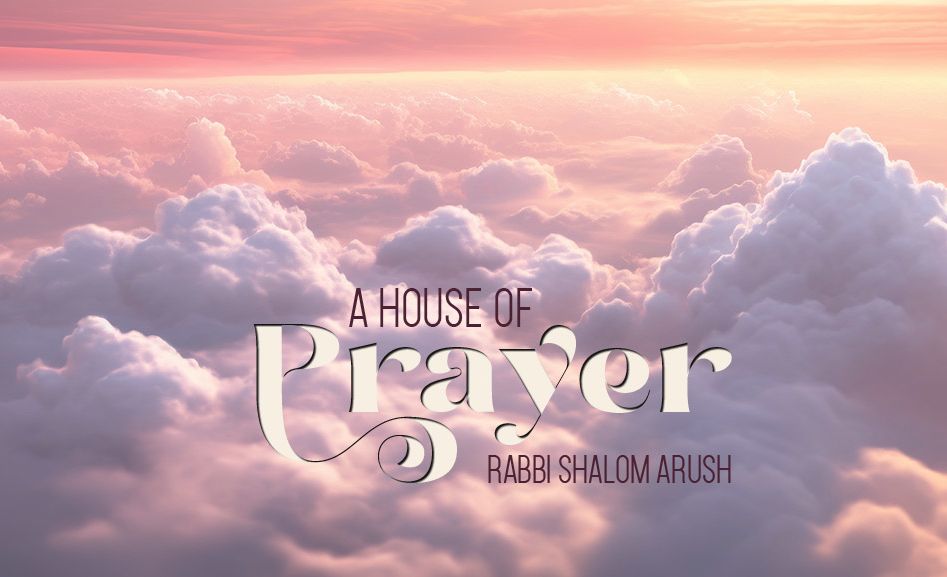
The Path to Peace
It has been nearly eighty years since the U.N. was founded to usher in an era of peace. Yet, the world is still consumed with conflict. What is stopping the long-awaited world peace? How can the mitzvah of Sukkot help?

World War I and World War II impacted millions upon millions of people. Lives were lost. Possessions were destroyed.
Following these horrific wars, the world’s leaders and heads of state joined together to establish the United Nations, an entity whose mission would be to avoid future global conflicts through compromise and peaceful resolutions. They were trying to achieve what Isaiah the prophet said, nation shall not lift the sword against nation, neither shall they learn war anymore. (Yeshayahu 2:3)
It has been nearly eighty years since the U.N. was founded to usher in an era of peace, yet the world is still consumed with conflict. We still witness wars and military engagements. Nations are in a never-ending arms race to develop more advanced and more deadly weapons of mass destruction. Therefore, the question must be asked: What is stopping the long-awaited world peace?
Less Faith – Less Peace
Technology and its advances continue to distract people from focusing on their spirituality. Faith has been diminished around the world. People have abandoned any sense of moral responsibility, and they deny Hashem’s Divine Providence in this world. This spiritual decay inevitably results in people living lives void of virtue. They become enslaved by their worst character traits, which fuel conflict and controversy.
Jealousy is one of the leading causes of conflict. This trait takes root when someone believes that everything that they have is the result of their own effort, their skills, and their abilities. However, if they had faith in Hashem’s Divine Providence, then they would believe that everything that they have is given to them with Divine Precision, and that everyone receives exactly what they need.
When people’s faith in Hashem as the Overseer of the world diminishes, jealousy infiltrates all aspects of life: between countries, political parties, friends and associates, and husbands and wives. Jealousy becomes the motivation behind every decision and interaction. It has destroyed nations, families, and couples.
Another leading cause of conflict is the trait of pride. As Chazal taught (Sota 47b), From the time when those with boastful [zeḥuḥei] hearts proliferated, dispute proliferated in Israel. When someone follows the deceitful guidance of the Yetzer Harah and they become boastful and proud, they believe that they are truly better than everyone else. Therefore, they try to discredit and devalue all of the virtues that exist in others and to focus solely on their shortcomings. This kindles the fire of disagreement and causes baseless hatred.
It is natural for those who are proud to chase after glory, honor, and respect. When they feel like someone else is receiving more honor than they, or, worse, someone insults their own honor, they attack that other person. This creates a dynamic where each person responds by further insulting the other. They rally their supporters, and each side believes that it is a “mitzvah” to chase after the opposing side. Sins abound and the fire of hatred and discord continues to burn.
In such situations, compromise is difficult. Ending a dispute is challenging. Even when these disagreements interfere with one’s life, a person would rather protect his dignity than humble himself and ask for peace and forgiveness from another. He would forfeit his entire life in this world to defend his honor.
All of this conflict stems from a lack of faith. As the Ramban explained in a famous letter to his son in Catalonia, “when a person has faith in their hearts, they believe that everything is a gift from Hashem. Nothing is the result of his strength or effort. As a result, he has nothing to be proud of. He does not expect respect or honor. For, he knows that respect and honor can only be credited to the Giver of Life in the World.”
The lack of faith also leads to anger which causes conflict. As the Baal Shem Tov explained (Igres Kodesh in the Tanya, Section 25), that Chazal taught (Zohar in Bereishit 27b) that when someone becomes angry, they are considered as idol worshipers. The reason is that a person can only become angry when they doubt Hashem’s hashgachah pratit and, instead, credit any event in their lives to any other person or outside influence. When they become angry because of something someone did to them or because they feel like they deserve a different set of circumstances, they are in actuality admitting that another force beyond Hashem can impact their lives. They worship “false idols”.
United Vapors
During the times of the Rozhiner Rebbe, zt”l, there was a non-Jew who was extremely learned, even in the holy Jewish works. He was fluent in Tanach and its commentaries. When the scholarly talents of the Rozhiner became known to the world, this non-Jewish scholar wanted to test his knowledge.
He met with the Rebbe and asked, “In Parshat Chukat the Torah says (Bamidbar 21:1), The Canaanite king of Arad, who lived in the south, heard that Israel had come by the route of the spies… Rashi explains that the king had heard that Aharon had died and that the Clouds of Glory had disappeared. What is the connection between the death of Aharon and the disappearance of the Clouds of Glory? How can you logically explain that these Clouds of Glory were created in Aharon’s merit?”
The Rebbe replied: “It is known that the scholars explain about the thin vapors that come from a person’s nose and from their breath, that if there are two people who love each other in one place, the vapors that leave their bodies also become intertwined and united together. However, when there is no connection between these people, then there is no connection between their vapors either.
“Chazal taught (Pirkei Avot 2:12), Be of the disciples of Aharon—a lover of peace, a pursuer of peace, one who loves the creatures and draws them close to Torah. Aharon worked to ensure that there was peace and harmony amongst the 600,000 Jews, to the extent that they were like one man with one heart. All these vapors that rose from the Jewish people joined together and formed Clouds of Glory. Therefore, they were called “Clouds of Glory,” because it was a great honor for Israel, that there was love and brotherhood, peace and friendship, among all of them.”
Time to Reinforce Faith
This concept possibly explains what Chazal taught (Succah 11b) that the mitzvah of the sukkah was given as a remembrance for the Clouds of Glory that the Jews dwelled in while journeying through the desert.
Hashem wanted the Jews to always remember the peace and unity that existed among all the tribes of Israel in those days, from which the Clouds of Glory were formed.
This mitzvah is more than a reminder but helps guide the Jews to seek out those same virtues by strengthening their faith. The holiness of the sukkah helps reinforce one’s faith as the Zohar taught (Volume III, p. 103) that the sukkah is called the “Shade of Faith”.
The Torah tells us (Vayikra 23:33) that the reason for the sukkah “for your generations to know.” One’s faith should be called knowledge, as it is written (Yirmiyahu 9:23) “that he understands and knows me, for I am the Lord“, and it is written (Divrei HaYamim I, 28:9) “know the God of your father”…
Sitting in the sukkah is the auspicious time for a person to contemplate and accept a heightened level of faith, to the degree that he can “know” Hashem. With his faith strengthened, a person can merit a life of peace, unity, and tranquility.
***
The Kalever Rebbe is the seventh Rebbe of the Kaalov Chasidic dynasty, begun by his ancestor who was born to his previously childless parents after receiving a blessing from the Baal Shem Tov zy”a, and later learned under the Maggid of Mezeritch zt”l. The Rebbe has been involved in outreach for more than 30 years and writes weekly emails on understanding current issues through the Torah. Sign up at www.kaalov.org.











Tell us what you think!
Thank you for your comment!
It will be published after approval by the Editor.